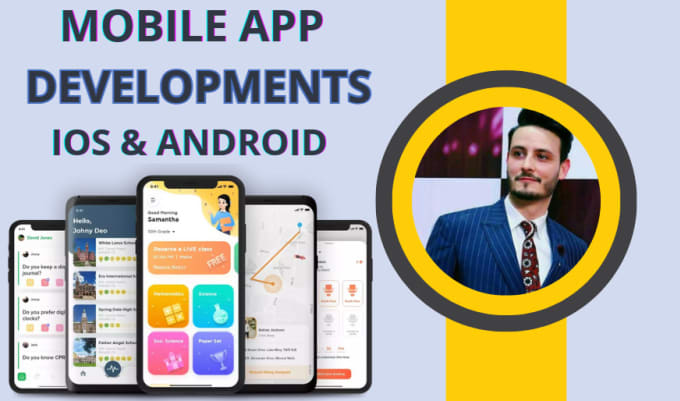The Android apps development company in Noida landscape is continually evolving, shaped by technological advancements, market demands, and user preferences. This dynamism has led to the emergence of several trends that are defining the future of Android applications. Companies at the forefront of these trends are not only setting benchmarks but also paving the way for innovative solutions that enhance user experience, improve performance, and introduce new functionalities. In this article, we will explore the key trends in Android app development and highlight the companies leading the charge.
1. Artificial Intelligence and Machine
Learning Integration
Artificial Intelligence (AI) and Machine Learning (ML) are revolutionizing Android app development. These technologies enable apps to offer personalized experiences, predictive analytics, and automation capabilities.
Google is a pioneer in this area, leveraging its expertise in AI and ML to enhance its suite of Android applications. For instance, Google Assistant utilizes natural language processing and ML algorithms to provide users with intelligent, voice-activated assistance. Similarly, Google Photos uses ML to categorize images and create personalized albums automatically.
Adobe is another company making significant strides in this domain. Their Adobe Sensei AI framework is integrated into various Adobe Android apps, offering features such as automated photo editing, content tagging, and predictive analytics for marketing.
2. Augmented Reality (AR) and Virtual
Reality (VR)
AR and VR technologies are transforming how users interact with mobile apps, offering immersive experiences that blend the digital and physical worlds.
Niantic, the company behind Pokémon GO, has set a high standard for AR applications on Android. By combining location-based services with augmented reality, they have created a unique gaming experience that encourages physical activity and social interaction.
Snapchat has also been a leader in incorporating AR into its platform. With features like AR filters and lenses, Snapchat has demonstrated how AR can enhance social media interactions, making them more engaging and entertaining.
3. Internet of Things (IoT) Integration
IoT is enabling a new wave of Android applications that interact with a variety of smart devices, from home automation systems to wearable technology.
Samsung is at the forefront of IoT integration in Android apps. Their SmartThings app allows users to control a wide range of smart home devices, providing a seamless and centralized interface for home automation.
Amazon has also made significant contributions with its Alexa app, which integrates with a multitude of IoT devices. This app allows users to control smart home devices, access information, and perform various tasks using voice commands.
4. 5G Technology
The advent of 5G technology is a game-changer for Android app development, offering faster data speeds, lower latency, and enhanced connectivity.
Qualcomm is a key player in the 5G ecosystem, providing the necessary hardware and software solutions that enable Android devices to leverage 5G capabilities. Their Snapdragon processors are designed to optimize performance for 5G networks, facilitating smoother and more responsive app experiences.
Verizon is another major contributor, working on expanding 5G coverage and providing developers with the tools and platforms needed to build 5G-enabled applications. Their 5G Labs focus on innovation across various sectors, including gaming, healthcare, and public safety.
5. Blockchain Technology
Blockchain is being increasingly integrated into Android apps to enhance security, transparency, and reliability.
IBM is leading the way in blockchain integration with its IBM Blockchain Platform. By providing developers with the tools to incorporate blockchain into their Android applications, IBM is facilitating the creation of secure and transparent apps, particularly in sectors like finance, supply chain, and healthcare.
Ripple is another significant player, focusing on integrating blockchain technology into financial applications. Their solutions enable fast, secure, and low-cost international payments, showcasing the potential of blockchain in transforming financial services on Android platforms.
6. On-Demand Apps
The on-demand economy is thriving, and Android app developers are focusing on creating apps that cater to this market, offering services like food delivery, transportation, and home services.
Uber has been a trailblazer in the on-demand app sector, providing a platform that connects users with drivers for transportation services. Their app's user-friendly interface, real-time tracking, and secure payment options set a standard for on-demand applications.
DoorDash is another leader in this space, offering a food delivery service that connects users with local restaurants. Their app's integration of features like real-time order tracking, personalized recommendations, and various payment options has made it a favorite among users.
7. Enhanced Security Features
With the increasing number of cyber threats, security has become a top priority for Android app developers. Companies are focusing on implementing robust security measures to protect user data and ensure privacy.
Google is leading the charge with its Google Play Protect feature, which scans and verifies apps for malware and other security threats. Additionally, Google's regular security updates for Android ensure that devices are protected against the latest vulnerabilities.
McAfee provides comprehensive security solutions for Android apps, offering features like malware protection, app lock, and safe browsing. Their focus on mobile security helps developers build apps that users can trust.
8. Progressive Web Apps (PWAs)
PWAs are gaining traction due to their ability to offer app-like experiences through web browsers, providing a seamless and responsive user experience without the need for installation.
Twitter has been a proponent of PWAs with its Twitter Lite app. This PWA offers a fast and engaging user experience, even on slower networks, making it accessible to a broader audience.
Pinterest has also embraced PWAs, providing a highly responsive and feature-rich web app that mirrors the functionality of its native app. This approach has helped Pinterest reach users who prefer web browsing over app downloads.
Conclusion
The landscape of Android apps development company in Noida is constantly evolving, driven by technological advancements and changing user expectations. Companies like Google, Adobe, Niantic, Snapchat, Samsung, Amazon, Qualcomm, Verizon, IBM, Ripple, Uber, DoorDash, McAfee, Twitter, and Pinterest are at the forefront of these trends, leading the way with innovative solutions and cutting-edge technologies. As these trends continue to develop, we can expect even more exciting and transformative developments in the world of Android applications.
